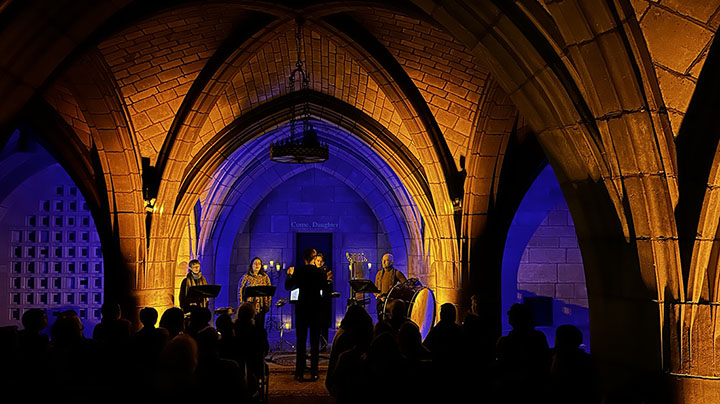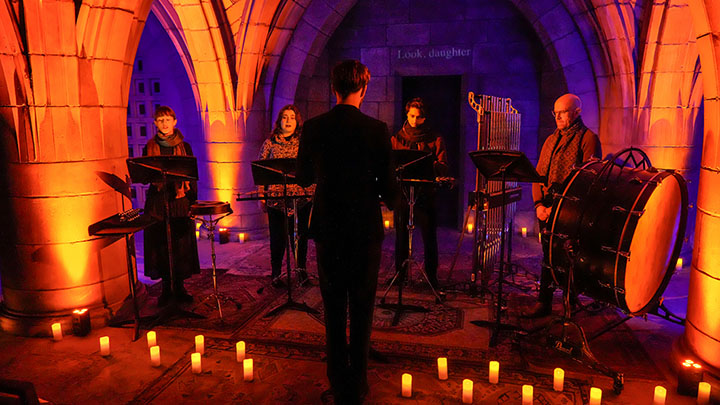
“We did not plan for the church boiler to break tonight,” joked Andrew Ousley, the founder of Death of Classical, in his introduction to Ekmeles’s performance of David Lang’s Little Match Girl Passion.
Willful or not, it certainly added to the ambience. And, requiring the crowd to place phones in a Yondr pouch, though childish-sounding, ensured a ring-free concert. That is, excluding Lang’s tintinnabulation.
This Passion — unlike Bach’s St. Matthew or St. John — is based on Hans Christian Andersen’s morbid fairy tale. In it, a girl sent out into the cold, without hat or shoes, to sell matches for her father has a series of visions, before succumbing to hypothermia. In Andersen’s original, the Biblical messaging is fairly subtle. But in Lang’s, this is brought to the fore, with the lines “Eli, Eli” (taken from the Psalms) as well as movements about the Little Match Girl’s rather Christ-like tears.
When, in his introduction, Ousley spoke of how the Passion was about “empathy for human suffering,” especially of innocents, I couldn’t help thinking of one subtext — the plight of Palestinian and Israeli children.
Lang’s minimalist style of composition, with an emphasis on meditative repetition and resonant purity, is a recipe for tugging at the heartstrings. With all four of Ekmeles’s singers multitasking, conductor Jeffrey Gavett was very necessary. In “Come daughter,” bass Steven Hrycelak also played the bass drum. “It was terribly cold” was marked by syncopated glockenspiel.
Though the program listed Charlotte Mundy and Amber Evans both as sopranos, Evans frequently strayed into “mezzo” territory, as did tenor Tomás Cruz. This created a fuller sound, echoing off the stone walls, than one would expect from four voices.
Despite the Passion’s predominant consonance, it is not without well-placed dissonance — for instance, the tone clusters in “Dearest heart” — as well as hiccupping vocals with loud rests. It sounded, at times, like Lang’s contemporaries John Adams or Arvo Pärt — especially in “Penance and remorse” — though I’m not sure how the composer would feel about that comparison.
Each movement, in itself, is like a flickering musical vignette — showing the Little Match Girl’s visions of the warm stove, the roast goose, the Christmas tree, and finally her beloved grandmother. The line “Where is your tomb?” felt all the more poignant in a crypt.
Throughout, I was astonished by Mundy’s clarion voice, especially in “Ah! Perhaps,” tuning fork held to ear. Sounding, somehow, both warm and icy at the same time. There was plenty of word painting, with church bells in “Have mercy, my God” and shivering stutters — “st-st-st-st” and “is-is-is-is” — in “When it is time for me to go.”
Cruz sounded almost like a countertenor singing “I closed my eyes,” the words wafting — or more like soaring — above “rest soft,” like medieval a cantus firmus, paralleling the Little Match Girl’s ascension to heaven.
A moment of silence — choked and heavy — preceded the applause.
Photos: Steven Pisano



























Comments